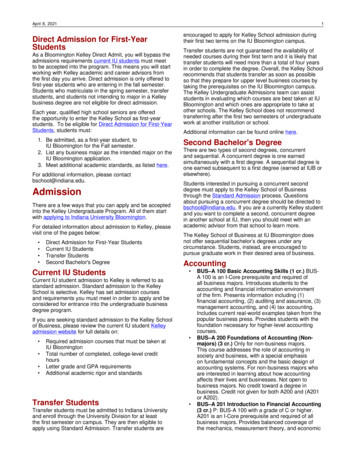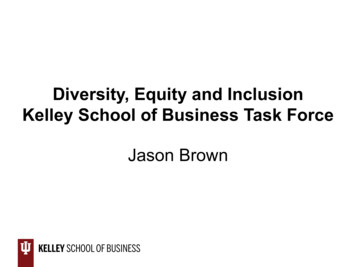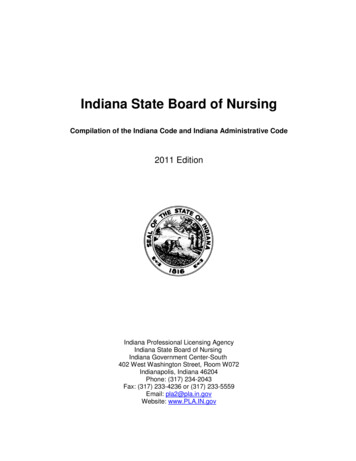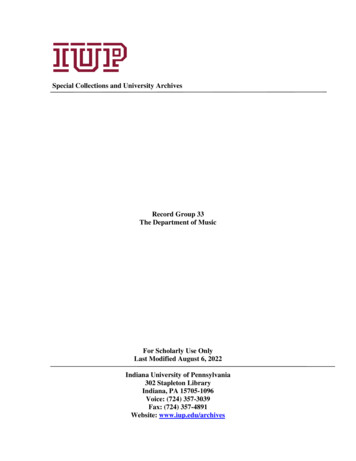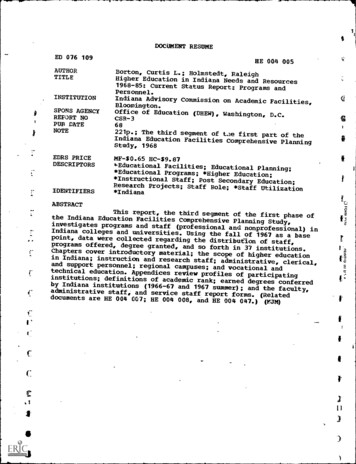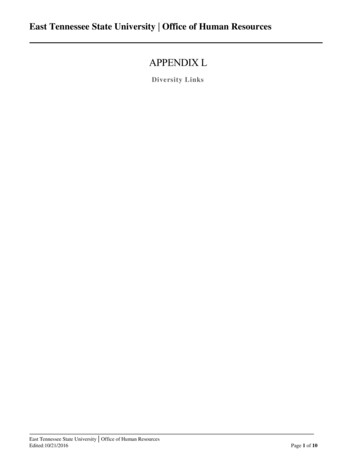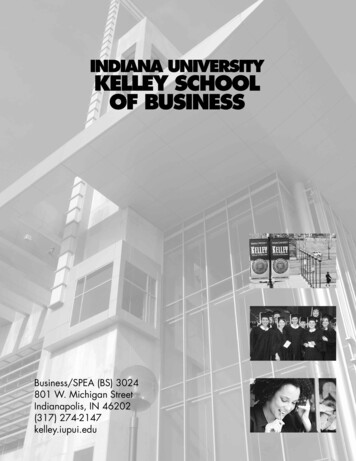
Transcription
INDIANA UNIVERSITYKELLEY SCHOOLOF BUSINESSBusiness/SPEA (BS) 3024801 W. Michigan StreetIndianapolis, IN 46202(317) 274-2147kelley.iupui.edu
64IUPUI All-Campus Bulletin 2008-10Contents65Message from the Associate Dean, KelleySchool of Business6565666666Kelley School of Business and theIndianapolis CampusPurpose of the SchoolDevelopment of the SchoolOrganization of the SchoolUseful Phone Numbers67676767Graduate ProgramsMaster of Business AdministrationMaster of Science in AccountingDoctoral Programs, Bloomington Campus676768686868Student Services and Campus ResourcesAdvising and CounselingInternational AffairsInternshipsWriting CenterUniversity College68 Undergraduate Program68 Program Objectives68 Honor Code68Admission69Policies Governing the UndergraduateProgramAcademic Regulations and ScholasticStandardsAcademic MisconductAcademic StandingAuditing CoursesColumbus Students Transferring to IUPUIIntegrative Core PrerequisitesMaximum Semester Credit Hour LoadMilitary-Related CreditPhysical Education CoursesProbation, Dismissal, and ReadmissionUpper-Level Business CoursesCredit Earned Externally or Transferred to IUCLEP and DANTES CreditCredit for Independent Study byCorrespondenceCredit for Self-Acquired CompetencyTransfer of CreditGrading SystemIncomplete CoursesPass/Fail OptionWithdrawalsGraduation RequirementsCredit 717171717171717272727273737373747474747575Credit Hours and GPA RequirementsSenior Residence RequirementDegree ApplicationsStatute of LimitationsSpecial OpportunitiesAwards, Recognition, and ScholarshipsBusiness Foundations Certificate ProgramHonors ProgramInternshipsMinor in BusinessOutside Minors for Business StudentsOverseas Study ProgramsSecond Bachelor’s DegreeStudent OrganizationsUndergraduate CurriculumDegree RequirementsGeneral-Education RequirementsBasic Business and Economics RequirementsTypical Program for Full-Time StudentsIUPU Columbus75 Departments and Majors75 Department of Accounting and InformationSystems75 Accounting Major76 Department of Business Law76 Department of Finance76 Finance Major76 Department of Management76 Management Major76 Entrepreneurship Emphasis76 Human Resource Management Major77 International Studies Major77 Department of Marketing77 Marketing Major77 Department of Operations77 Supply Chain Management7777787979808081818282Undergraduate CoursesAccounting and Information SystemsComputer Information SystemsBusiness LawFinanceReal EstateManagementInternational BusinessMarketingOperations and Decision TechnologiesGeneral and Honors Courses83Kelley School of Business Administratorsand Faculty, Bloomington andIndianapolis
Kelley School of BusinessMessage fromthe AssociateDean, KelleySchool ofBusinessThank you very much for your interest in theundergraduate program of the Kelley School ofBusiness. The school’s history can be traced to the early1920s, when a select group of students and faculty hadthe foresight to undertake a program of study that hasbecome known throughout the world as one of thefinest of its kind. From both the Indianapolis andBloomington campuses, the Kelley School of Businessconducts operations across the globe.The joint resources of Indiana University–PurdueUniversity Indianapolis (IUPUI) and IU Bloomingtonpermit us to offer outstanding programs in businessadministration to a significant percentage of Indiana’spopulation.IUPUI is Indiana University’s capital-city campus. AsIndiana’s state capital and a major metropolitan area,Indianapolis is an ideal place to study business. Withincity blocks of the Kelley School is the highestconcentration of corporations, government offices andagencies, small businesses, health care providers,professional practices, and not-for-profit organizationsin the state. The campus affords a unique and dynamicenvironment for learning, conducting research,teaching, and collaborating with businesses. It isdifficult to imagine a richer context in which students ofall ages can enhance their knowledge and leadershipskills while maximizing their personal development.The curriculum of the undergraduate program isbased on a solid foundation of study in the liberal artsand sciences that develops strong interpersonal,communications, and decision-making skills. To thiscan be added specialized education in the fields ofaccounting, computer information systems, finance,management, human resource management,marketing, or supply chain management. But, intoday’s global environment, training in businessfunctions alone is insufficient. For this reason,students broaden their programs of study withlearning relevant to international business affairs. Thisrequirement may be fulfilled in any of the followingways: language study, international business andeconomics courses, participation in an approvedoverseas study program, or approved liberal artscourse work with an international focus. Our intent isto help prepare students for the global economicenvironment of the future.The entire program is offered in a convenient,accessible way to both full- and part-time students.High-tech delivery systems, joint programs with otherschools at IUPUI, a challenging Honors Program,student organizations, and alumni activities make theKelley School of Business an exciting place to be.Participation in the undergraduate program involvesmore than merely taking courses. We offer acomprehensive educational experience that preparesyou to join the growing number of IU graduatesproviding leadership in business organizations aroundthe world.Philip L. CochranAssociate Dean for Indianapolis ProgramsKelley Schoolof Business andthe IndianapolisCampusPurpose of the SchoolThe Indiana University Kelley School of Businessfosters learning about the creation, management, andcontinuing adaptation of organizations and enterprisesin an ever-changing environment.This basic purpose requires that the school engage in: The generation and documentation of knowledgeand the sharing of that knowledge with theacademic community The organization and preservation of knowledge The transmission of knowledge to a broad mix ofstudents and practicing executives The application of knowledge to benefit our manyconstituencies.ResponsibilitiesThe school will realize this vision to the extent that itsucceeds in addressing the needs of its variousconstituencies, which have specific and often widelydiffering expectations. To meet these obligations, theschool must balance its efforts along severaldimensions. As an academic institution, the school isresponsible for the quality and quantity of itsresearch, for the preparation of new researchers,and for service to the university system and wideracademic community. As a public institution, the school is responsiblefor the quality of the graduates from its programsand for sharing both its information and itsexpertise with the community at large. As a professional school, the school is responsiblefor serving the diverse segments of the businesscommunity in Indiana, across the nation, andaround the world. As a state-assisted institution, the school has acontinuing responsibility to serve the people of thestate of Indiana.Shared ValuesCritical to the school’s success is its distinctive culture.Certain key values and widely shared beliefs shape theessential character of the school and thereby becomeimportant criteria for basic decisions.Quality Emphasis The school seeks to meet itsgoals with distinction and to do so consistently. Thisprinciple requires insight into its areas ofcompetence, the aspirations of the faculty and staff,and the availability of resources.65Proactive Change Change in any organization isdriven ultimately by the long-term forces that shapethe body of constituencies it was created to serve.Business organizations constantly undergo change.The rate of change may vary, but the environment isalways dynamic. The school is committed not only toresponding to change via its research variety andcurriculum emphases, but to anticipating basicchanges as well.Integrative Programs The school attracts facultywho have a broad understanding of businessenterprises and a capacity for configuring andinterrelating business functions. This capacity isdemonstrated in the school’s academic programs,which emphasize the interdependence of businessfunctions, provide a solid grounding in the liberalarts, and recognize the importance of breadth ofunderstanding to overall organizational success.Programmatic Approach to Education Theschool’s degree programs are more than just a set ofrequirements. Every step of the degree sequencecomprises a carefully planned and coordinated set ofactivities. Support activities such as admissions andplacement counseling, extracurricular activities,overseas study opportunities, and faculty involvementin student activities enrich the student’s course work.Balance and Diversity The school conscientiouslyseeks to achieve breadth in its research focus,curriculum, pedagogy, and faculty and studentcomposition. Diversity of viewpoint and background isencouraged, and heterogeneity is nurtured. Theschool recognizes the need to provide students andfaculty with a rich, balanced context for the study ofbusiness as well as a learning environment that isconducive to the lively exchange of ideas andintellectual stimulation necessary for productive,independent scholarship.Citizenship Good citizenship is valued strongly inthe school. Citizenship involves more than fulfillingformal academic requirements. It encompassesparticipation in multiple roles, a willingness to serve,and a commitment to perform activities that sustainthe broader life of the school as an institution.Citizenship is manifested in both respect for individualrights and acknowledgment of individualresponsibilities to the institution.Collegiality A spirit of collegiality is a hallmark ofthe school. It is grounded in the faculty’s inherentrespect for each other and for students as individuals.The goal is to maximize development of the specificabilities and potential each student brings to theinstitution. The school sustains this spirit throughmutual trust and demonstrates it through theencouragement of student-faculty interaction andstudent consultation through organizations andadvisory groups.Undergraduate Principles On May 7, 1998, theIUPUI Faculty Council approved the adoption of thefollowing six principles of undergraduate learning:core communication and quantitative skills; criticalthinking; integration and application of knowledge;intellectual depth, breadth, and adaptiveness;understanding society and culture; and values andethics. These principles provide the conceptualframework for the general-education component ofthe undergraduate curriculum at the Kelley School ofBusiness.
66IUPUI All-Campus Bulletin 2008-10Development ofthe SchoolToday, the IU Kelley School of Business operates asone school on two campuses: Bloomington andIndianapolis. Business education at Indiana Universitybegan in Bloomington more than a century ago. Thefirst Indiana University catalog (1830-31) included acourse on political economy in the curriculum. Fromthis first course developed a Department of PoliticalEconomy, which was later renamed the Department ofEconomics and Social Science. Early courses in theseareas grew into what is now referred to as the “coreprogram” of study in the Kelley School of Business.In 1902, several business courses were introducedand listed in the university catalog. A two-year“commercial course,” which required two years ofprecommerce work in liberal arts, was established. In1904, the first business catalog, referred to by thecommercial course number, was published. Thesecommerce courses constituted the last years of a fouryear course of study leading to a baccalaureatedegree. The first two years were a precommercerequirement and included all the required courses ofthe liberal arts curriculum of that period.Thus was established more than a century ago thepattern of building a program of professionaleducation for business upon a liberal arts base—apattern maintained throughout the years and currentlyemphasized in the education of U.S. businessprofessionals. In 1920, a separate School ofCommerce and Finance was organized. The schoolbecame a member of the American Assembly ofCollegiate Schools of Business in 1921, and in 1933, itwas renamed the School of Business Administrationand placed under the direct control of its own faculty.In 1938, the name of the school was shortened to theSchool of Business.The Junior Division (now the University College) ofthe university was established in 1942 for all first-yearstudents. From that time until 1994, enrollment in theSchool of Business did not include freshmen.Graduate work in business administration, firstauthorized in 1936, expanded rapidly after World WarII. Programs for the degrees Master of BusinessAdministration and Doctor of Business Administrationwere instituted in 1947. In 1961, the designation ofthe area of study formerly referred to as the GraduateDivision of the School of Business was changed to theGraduate School of Business. With the reorganizationof the university in November 1974, the School ofBusiness began operating at the Bloomington andIndianapolis campuses.Although business courses were offered as early as1916 on the Indianapolis campus, the bachelor’sdegree in business was not available at the Indianapoliscampus until the 1969 merger with Purdue University.Beginning in 1969, divisional structure emerged inIndianapolis with an assistant chairperson at its head.In 1969-70, a complete undergraduate degreeprogram for four major areas in business was offered,as well as three two-year certificate programs.The terms “Graduate School of Business” and“undergraduate program” are used in this bulletin onappropriate occasions to designate the level of studyconcerned. When the term “Kelley School of Business”is used, reference is being made to the entire school,including both the Graduate School of Business andthe undergraduate program on both campuses.Organizationof the SchoolThe school’s resident faculty of approximately 200members is its basic governing body. The variousprograms and curricula, as well as all major policyconsiderations, are reviewed and approvedperiodically at meetings of the entire resident faculty.Administrative support for the school is provided bythe Office of the Dean, by a chair in each of theschool’s eight academic departments, and by a chairof each academic program. The Academic Counciladministers Kelley School of Business policy. Thecouncil is made up of those administrators mentionedabove, with the addition of two elected facultyrepresentatives. Additionally, a number of committeesappointed by the dean recommend to the facultyvarious academic and operating policies. At times,these committees are also assigned specificadministrative responsibilities.The school’s administration manages its programs onboth the Bloomington and Indianapolis campuses.The Office of the Dean consists of the dean, theassociate dean for academics, the associate dean forIndianapolis programs, and the associate dean forresearch and operations. It is assisted by variouschairs and directors. Administrative support forinstructional programs is provided by fiveorganizational units: the Kelley School of BusinessUndergraduate Program Office (Bloomington andIndianapolis), the M.B.A. Office (Bloomington), theM.B.A. Office (Indianapolis), the Doctoral Program(Bloomington), and Kelley Executive Partners.Admissions, student counseling and advising, anddegree certification are provided by professional staffmembers assigned to each of these organizationalunits. (See “Graduate Programs” in this bulletin.)Departmental and Curricular Structure Thefaculty of the Kelley School of Business is organizedinto nine academic departments. Most of the school’scourse offerings are provided by faculty in theorganizational units. As indicated in the descriptionsof the school’s curriculum in this bulletin, adepartment may be responsible for several areas ofspecialization.Although recognition is given to the importance ofdepartmental units, the Kelley School of Businessfollows the general principle of flexibility inorganization. Thus, some members of the faculty mayhave responsibilities in two or more departments,programs, or areas of specialization. As well as beingresponsible for a specific division of the school’soperation, the chairs of the departments areconsidered to be general officers of the school.Research Centers and Institutes In recent years,the Kelley School of Business has put new emphasison the establishment and promotion of researchcenters and institutes. These organizational units aredistinct from the traditional academic departments,and therein lies their strength. The centers haveresearch and outreach to the business community astheir primary objectives. This focus serves to makethem more interdisciplinary in nature and morevisible both inside and outside the university. TheKelley School of Business currently supports sevenresearch centers, each with a specific mission and anatural constituency in the business world: Indiana Business Research Center (IBRC) Center for Education and Research in Retailing Center for Real Estate Studies Johnson Center for Entrepreneurship andInnovation Indiana Center for Econometric Model Research Center for International Business Education andResearch (CIBER) Randall L. Tobias Center for Leadership ExcellencePublications The Kelley School of Business assiststhe faculty in preparing research results and otherpublications for communication to various audiences.In addition to periodic monographs and discussionpapers, the school regularly distributes twopublications, both appearing six times a year.Indiana Business Review (IBR) This publicationcontains articles based on research analysis of theeconomic environment of the state and its regions,counties, and cities. Because of its importance toplanners in both the public and private sectors, IBR isprovided without charge to those who request it.Business Horizons Since 1957, the Kelley School ofBusiness has published a journal of analysis andcommentary on subjects of professional interest tobusiness executives and students of business.Business Horizons is managed by an editorial boarddrawn from the school’s faculty. It publishes articlesby many outside contributors as well as by theschool’s own faculty and students and is sent to anational and international audience on a subscriptionbasis.Executive Education The director of KelleyExecutive Partners is responsible for coordinating allnon-degree educational programs, notable customdesigned programs for client companies, and specialprograms for company consortia.Useful Phone Numbers(Area Code 317)Academic Advising—BusinessFaxAdmissionsIUPUI UndergraduateGraduateEvening M.B.A.Master of Science in AccountingKelley Direct M.B.A.Student 5278-3885278-1566274-2147
Kelley School of BusinessGraduateProgramsMaster of BusinessAdministrationThe Indiana University M.B.A. Program is recognizedas one of the top graduate business programs in thecountry. It offers three programs that lead to theMaster of Business Administration degree.Admission to any of the programs is selective and isbased on the evaluation of several factors, includingresults from the Graduate Management AdmissionsTest, undergraduate performance, essays,recommendations, work experience, leadership, andother indicators of potential for success in a rigorousprogram of study and in a business career.Bound by a common body of knowledge andphilosophy, each program is designed to meet thediverse needs of students at different levels of careerdevelopment and responsibility. For furtherinformation on the curriculum, format, prerequisites,and admission requirements for each program,contact the specific program of interest.Evening M.B.A. Program,Indianapolis CampusCandidates for the Evening M.B.A. degree program inIndianapolis come from diverse academicbackgrounds and represent many businesses andindustries. The program incorporates a wide range ofbusiness issues and integrates business disciplines toprovide a strong program experience. Study teamsand networking play an integral part in the eveningprogram. Skill building in the areas of leadership,collaborative decision-making, teamwork, andcommunications are integral aspects of the totalprogram experience.Modules of study generally span one semester withclass meetings two nights per week. A streamlined 32month, 51-credit-hour program allows for maximumplanning and integration with career and personalcommitments.Qualified people from all academic backgrounds whorepresent any business or industry and who aremotivated to study in a challenging graduate businessprogram are encouraged to apply for admission tograduate programs in the Kelley School of Business atIndiana University in Indianapolis. Applicationmaterials are due in the M.B.A. office by April 15 forAugust entry and by November 1 for January entry. Forinformation, contact:Evening M.B.A. OfficeKelley School of BusinessBusiness/SPEA 3024801 W. Michigan StreetIndianapolis, IN 46202-5151Phone: (317) 274-4895Fax: (317) 274-2483Web site: kelley.iupui.eduE-mail: mbaindy@iupui.edu67M.B.A. Program,Bloomington Campusundergraduate performance, recommendations, andwork experience.Bloomington’s program is a full-time, two-yearresidential program taught during the day for studentswho plan to take a leave from their careers while theypursue graduate education. For information, contact:For further information on the curriculum format,prerequisites, and admission requirements, contact:M.P.A. ProgramKelley School of BusinessBusiness/SPEA 3024801 W. Michigan StreetIndianapolis, IN 46202-5151Phone: (317) 278-3885Web site: kelley.iupui.eduDirector of Admissions and Financial Aid, GraduateProgramsKelley School of BusinessIndiana University1309 E. Tenth StreetBloomington, IN 47405-1701Phone: (812) 855-8006Kelley Direct OnlineM.B.A. ProgramThe Kelley Direct Online M.B.A. Program is designedfor professionals who wish to continue theiremployment while earning their M.B.A. The KelleyDirect Program is the only such graduate managementprogram offered by a top-20 business school that isalmost exclusively delivered entirely over the Web.Among the tools used are discussion and debateforums, online testing, audio streaming and videostreaming, and simulations for case-based learning.Course materials, including audio and videopresentations and virtual tours, may be accesseddirectly from the Web. The class interaction isasynchronous with some synchronous elements,allowing students the flexibility to balance family andcareer demands. For information, contact:Kelley Direct AdmissionsKelley School of Business777 Indiana Avenue, Suite 200Indianapolis, IN 46202Phone: (317) 278-1566Fax: (317) 274-7301Web site: www.kd.iu.eduMaster of Science inAccountingThe Master of Science in Accounting program isdevoted to teaching the skills required of today’saccountant. The plan of study ensures that studentsare not only well versed in the technical aspects oftheir chosen specialty but also the nontechnical skillsthat are required for them to become true leaders inindustry and government.M.S. in Accounting Program,Indianapolis CampusStudents may apply to the M.S. in Accounting programwith or without academic background in business oraccounting. Those students entering the program witha bachelor’s degree in business normally mustcomplete a minimum of 30 credit hours of coursework. Those with backgrounds in other fields may berequired to do additional work to develop expertise inthe core areas of business.Students may apply to the program after completing abachelor’s degree. Admission selection is based on theevaluation of several factors, including results from theGraduate Management Admissions Test (GMAT),Doctoral Programs,Bloomington CampusIIndiana University offers two doctoral programs inbusiness: the Doctor of Philosophy (Ph.D.) and theDoctor of Business Administration (D.B.A.). The Ph.D.is awarded through the University Graduate School,and the D.B.A. is awarded through the Kelley Schoolof Business. The D.B.A. has been offered sinceFebruary 1954; the Ph.D. in business since October 1,1982.The Office of Doctoral Programs in the Kelley Schoolof Business administers both programs. Students mayselect either degree designation at the time ofapplication. It is possible to switch from one degreeprogram to the other, provided all the requirements ofthe new degree are met. While the objectives andrequirements for both degrees are quite similar, thereare some differences. Applicants should decide whichdegree best fits their career and intellectual objectives.For more information, contact:Chair, Doctoral ProgramsKelley School of BusinessIndiana University1309 E. Tenth StreetBloomington, IN 47405-1701Phone: (812) 855-3476Student Servicesand CampusResourcesSee also “Useful Phone Numbers.”Advising and CounselingOur professional advising staff members are devotedto assisting students in making informed program andcareer choices. All undergraduates in the KelleySchool of Business choose a major, such asaccounting or finance. (See “Departments andMajors” in this bulletin.) Academic advisors who holdmaster’s degrees are available to help studentsunderstand and plan for meeting major requirements.Academic advisors for the Kelley School of Businessare available in the Business/SPEA Building 3024, 801W. Michigan Street. Please call (317) 274-2147 toschedule an appointment with an advisor or takeadvantage of our limited walk-in hours. Students alsomay obtain counseling from the Kelley CareerPlacement Office, the Office of International Affairs, orthe University College (UC).
68IUPUI All-Campus Bulletin 2008-10International AffairsInternational students may continue to seek general orpersonal support services through the Office ofInternational Affairs after admission to the KelleySchool of Business.Undergraduates in the Kelley School of Business areeligible to participate in foreign study programsestablished by Indiana University. These programsoffer undergraduates the opportunity to do part oftheir academic work abroad. Students can participatein summer programs in Finland, Germany, or theNetherlands; semester programs in Chile, France, theNetherlands, and Singapore; and regular academicyear programs, as well as programs offered throughthe Center on Southeast Asia.Students also may apply for overseas internships.Advanced standing, high scholarship, and stronglanguage skills are required. In addition, IUPUIadministers a number of short-term programs ofinterest to business students.International students for whom English is a secondlanguage and who seek information about languagetests or about academic assistance should contact thecoordinator of English as a Second Language,Cavanaugh Hall, 425 University Boulevard, (317)274-2188.On-campus housing is available for internationalstudents. (See “Housing” in this bulletin.)For more information, contact the Office ofInternational Affairs, ES 2126; phone (317) 274-7000.InternshipsInternships are a unique opportunity for students towork in their chosen field of study. The program placesstudents who are in advanced stages of their degreeprograms in professional positions for one-semesterplacements. (See also the section “Internships” under“Special Opportunities” in this bulletin.)Writing CenterThe University Writing Center provides tutoring for allkinds of writing needs as well as a hotline service fortelephone inquiries. Faculty and trained writingfellows serve as tutors. Business school students areencouraged to use the center’s services. The writingcenter is located in Cavanaugh Hall 427, 425University Boulevard; phone (317) 274-2049 or(317) 278-8171.University CollegeThe University College (UC) is the academic home formost IUPUI undergraduate students with fewer than56 credit hours. Among the UC students are those whoplan a business major but have not yet been admittedinto the Kelley School of Business. To request a UCstudent manual, please contact University College,IUPUI, 815 W. Michigan Street, Indianapolis, IN46202-5164; phone (317) 274-4856.Some students with a bachelor’s degree may wantinformation about taking additional undergraduatecourses; for example, a student who holds a B.A.degree may wish to take accounting courses toprepare to sit for the C.P.A. exam. These studentsshould contact the IUPUI Undergraduate AdmissionOffice, 425 University Boulevard; or phone (317)274-4591. (See also “Second Bachelor’s Degree” inthe “Special Opportunities” section of this bulletin.)UndergraduateProgramThe Undergraduate Program of the Kelley School ofBusiness provides opportunities for breadth ofeducation as well as for a reasonable amount ofspecialization. As a member of the Association toAdvance Collegiate Schools of Business (AACSB), theschool subscribes to the principle that a significantportion of a student’s academic program should be ingeneral-education subjects, complemented by study inthe basic areas of business administration. Thisassures the planning of balanced study programswhile enabling a student with an interest in one ormore professional areas of business to specialize inthose fields.All undergraduate study programs also includecourses that ensure the development of a basicunderstanding of the principles and practices involvedin the management of business firms in the dynamiceconomic, social, and political environment of theworld today. At IUPUI, three interrelated, rigorousjunior-level courses in the management of finance,marketing, and operations, known collectively as theIntegrative Core, are required of all business majors.Integrative Core studies emphasize the trends likely toshape the pattern of the world in the years ahead.Beyond these basic requirements, student
The terms "Graduate School of Business" and "undergraduate program" are used in this bulletin on appropriate occasions to designate the level of study concerned. When the term "Kelley School of Business" is used, reference is being made to the entire school, including both the Graduate School of Business and
